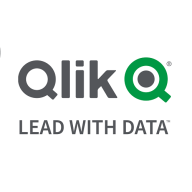

Find out in this report how the two Cloud Data Integration solutions compare in terms of features, pricing, service and support, easy of deployment, and ROI.


| Company Size | Count |
|---|---|
| Small Business | 3 |
| Midsize Enterprise | 3 |
| Large Enterprise | 6 |
| Company Size | Count |
|---|---|
| Small Business | 2 |
| Midsize Enterprise | 2 |
| Large Enterprise | 4 |
Qlik Sense is a powerful business intelligence tool that offers a range of features to help organizations make faster and more informed decisions. Its primary use cases include operational and financial dashboards, self-service reporting, and centralized access to cross-functional reports. The solution is praised for its mobile platform, ease of use, data-sharing capabilities, and extensibility.
Qlik Sense has helped organizations improve data literacy, reduce time consumed in complex reports, and provide widely available MI to senior stakeholders. It also enables self-service analytics, improves data quality and governance, enhances collaboration, and reduces costs.
Talend Data Integration efficiently handles data transformation and integration with ease, supporting complex business needs. It enables seamless data management across all sources.
Talend Data Integration offers a robust platform for managing and transforming data. It connects disparate systems, enabling data flow across various environments. Users benefit from its ability to streamline processes and improve data accuracy. Its user-friendly interface and flexibility make it a preferred choice for data integration experts.
What are the key features of Talend Data Integration?In finance, Talend Data Integration enhances transaction data processing and compliance reporting. In healthcare, it ensures accurate patient data management, while in retail, it optimizes inventory and customer data analysis. Its adaptability makes it valuable across multiple sectors, addressing specific industry requirements.
We monitor all Cloud Data Integration reviews to prevent fraudulent reviews and keep review quality high. We do not post reviews by company employees or direct competitors. We validate each review for authenticity via cross-reference with LinkedIn, and personal follow-up with the reviewer when necessary.